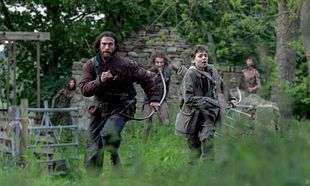Retired music critic Clara (Braga) won't budge. Despite all her neighbours moving out of her titular beachfront apartment building Clara will not entertain the offer of the construction company of attractive alternative accommodation. This building has history. This building has memories. She has lived here all her life and there's no damn way she's moving. A breast cancer survivor, Clara has seen off worse than the passive-aggressive Diego (Carrao) and so when his company begin a campaign of intimidation she's ready…
A character study, Kleber Mendonca Filho (Neighbouring Sounds) isn't too concerned initially with allowing the plot involving the construction company to dominate with the Brazilian writer-director more interested in putting Clara into random situations and seeing how she'd react. And her reactions are always fascinating and unpredictable: One scenario sees a kiss in a car with a date escalate to heavy petting and when she explains she's 'had surgery', the guy backs off, leaves her home; instead of moping around her empty apartment contemplating a lonely life, Clara puts on a record and dances. Water off a duck's back.
Clara wants to hang on to the past but is also prepared to move with the times – she explains in detail to a journalist why she prefers vinyl but doesn’t reject the advent of MP3 outright. When put under pressure by her children to sell up and move out of the old building, she says, "When you don't like something, it’s 'old'. When you do, it's 'vintage'." She's a cool lady and Braga is breathtaking in the role, juggling dogged determination for what she wants while expressing compassion and understanding for the standpoint and viewpoints of others.
But slowly the subplot involving the possible eviction begins to dominate. The escalation of the company’s intimidation rises subtly: First it's all smiles and generous offers before the encroachment on Clara's privacy beings: a sex party is hosted upstairs into the small hours and she wakes up to find excrement on the stairs. It’s not long before the kindly Diego reveals himself to be a wolf in sheep's clothing. The subplot attempts to get under the fingernails of contemporary Brazil with Clara the only one who seems to lament the values she feels her country has lost.
Filho's relaxed style pulls one into the story and you’re engrossed before you know it. It has such a laidback vibe – the opening 80s-set sequence has Clara and friends driving onto the beach to listen to Queen's Another One Bites The Dust sets the tone – it's like sitting into a comfortable chair. In fact, the opening segment is just as interested in Clara's elderly aunt Lucia (Thaia Perez) as it is in the heroine, even going as far as giving Lucia flashbacks to her younger years. The 70s style pans, going from wide shots to close up (always bringing the eye back to the chest of drawers: nondescript yet laden with memories) are unhurried; the story (pushing two and a half hours) moves at its own pace.














































































